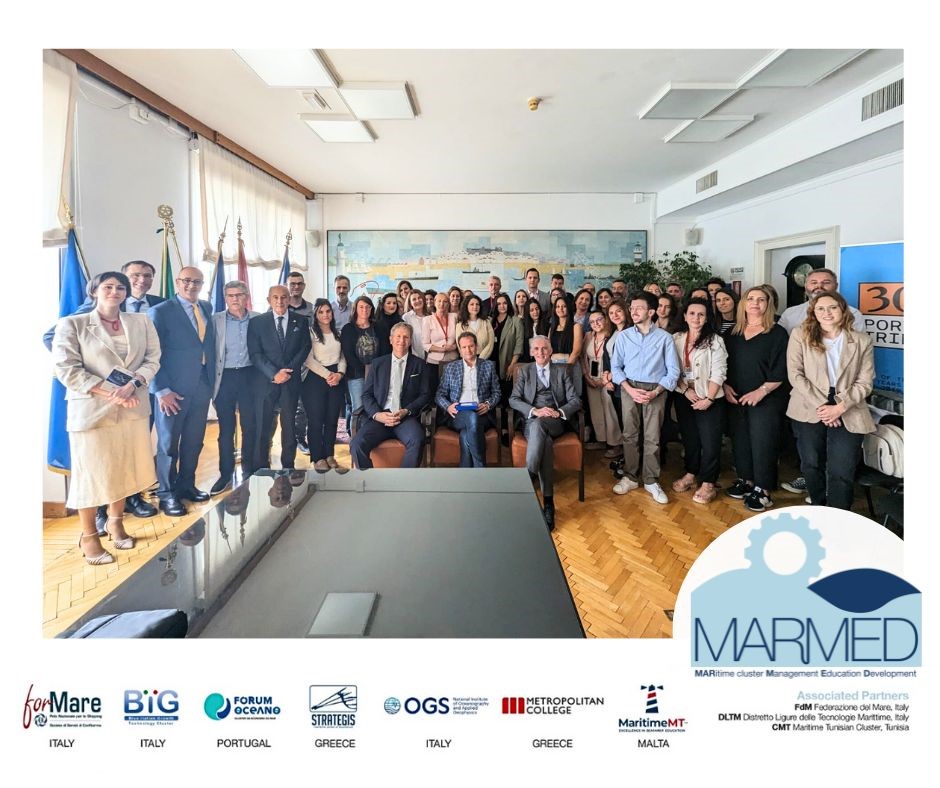Blue Economy is a pivotal industry for the future welfare and prosperity of the global economy, providing essential goods, energy, tourism, and transport for millions of people. However, blue economy is a complex ecosystem made of highly diversified sectors that should collaborate closely and work in strong synergy to achieve sustainable results.
In this context, Maritime Clusters play a crucial role in assisting local stakeholders within the Blue Economy by identifying development opportunities and fostering sustainable growth and job creation. They achieve this by supporting innovative products and services, aiding the internationalization of micro, small, and medium enterprises, spreading new knowledge and skills, and integrating sectoral policies at both local and national levels. As result, Maritime Clusters have increasingly been recognized as vital drivers of innovation and diversification within the Blue Economy.
What is a Maritime Cluster?
A Maritime Cluster is a grouping of companies within specific maritime sectors, alongside research and educational institutions focused on related fields. It also includes governmental and regional support mechanisms aimed at fostering growth and innovation, where all participants share a unified vision for strategic development.
Addressing Skill Gaps in Maritime Clusters
Despite their recognized role as enablers of a more sustainable Blue Economy, there is a notable lack of competitive managerial staff with specialized skills within maritime clusters. In fact, they often face a shortage of competitive managerial staff who lack specific innovation and management skills or specialization in different areas of the Blue Economy. Simultaneously, there is a growing need for more effective entrepreneurial and innovation skills among professionals in these clusters, making essential the promotion of competitive profiles for Marine and Maritime Clusters across Europe, particularly in the Mediterranean region.
The Erasmus+ Project MARMED: Bridging the Skills Gap
To address these challenges, a consortium of Mediterranean Maritime Clusters, training centers, and research organizations, supported by the WestMED Maritime Cluster Alliance, has risen to the challenge. They are developing an innovative professional profile to enhance the competitiveness of Maritime Clusters in the Mediterranean area. This collaboration is part of the Erasmus+ Project MARMED – Maritime Cluster Management Education Development. The consortium includes five clusters from Italy, Greece, Portugal, and Tunisia of the WestMED Maritime Cluster Alliance, and four training centers and research organizations from Italy, Greece, and Malta operating in the Blue Economy sector.
The MARMED project is a successful example of collaboration among Maritime Clusters in the Mediterranean Area, aimed at achieving the following outcomes:
- A comprehensive gap analysis report on upskilling and reskilling competencies of Mediterranean Maritime Clusters.
- Innovative training models aimed at enhancing the capacity building of Blue Cluster Managers.
- An innovative, accessible, and transferable learning approach for a more resilient, sustainable, and innovative Blue Economy path.
- A set of recommendations for Blue Cluster Managers’ training and capacity building, addressed to all actors in the Blue Economy ecosystem.
A Successful Study Visit in Trieste
One of the most recent and successful activities of the MARMED project was the Study Visit organized on June 13-14, 2024, in Trieste, Italy. This key event was part of the Blue Cluster Manager Training, an online piloting training course designed and conducted under the MARMED Project.
The study visit included 20 participants, comprising expert cluster managers, aspiring cluster managers, and Blue Economy experts who are currently undergoing the Blue Cluster Manager Training. This two-day event provided an excellent opportunity to better understand the complex role of cluster managers and to deepen participants’ knowledge of different aspects of the Blue Economy.
The first day began at the Trieste Port Authority, where participants attended the GeoAdriatico conference session on "Blue Economy: Hydrogen, Green Shipping, and European Integration," featuring insightful lectures from esteemed experts in the sector. After the conference, participants enjoyed a scenic boat ride back to Trieste city center. The afternoon was dedicated to practical examples of sea management in the Friuli Venezia Giulia Region, with presentations from regional technical clusters showcasing innovative strides in maritime technology and sustainable growth.
The second day highlighted the work of the WestMED Initiative and the Libya / Rebuild project, focusing on sea basin strategies and pilot actions essential for fostering a sustainable Mediterranean Blue Economy. A roundtable discussion with Maritime Cluster Managers from different regional contexts across the Northern and Southern Mediterranean followed. The day concluded with a compelling talk on Maritime Spatial Planning, emphasizing the significance of the EU Green Deal and the UN Sustainable Development Goals in shaping a resilient and prosperous maritime future.
The study visit underscored the importance of promoting the role of maritime clusters and served as a best practice example of collaboration, enhancing the importance of Maritime Cluster managers and staff.


